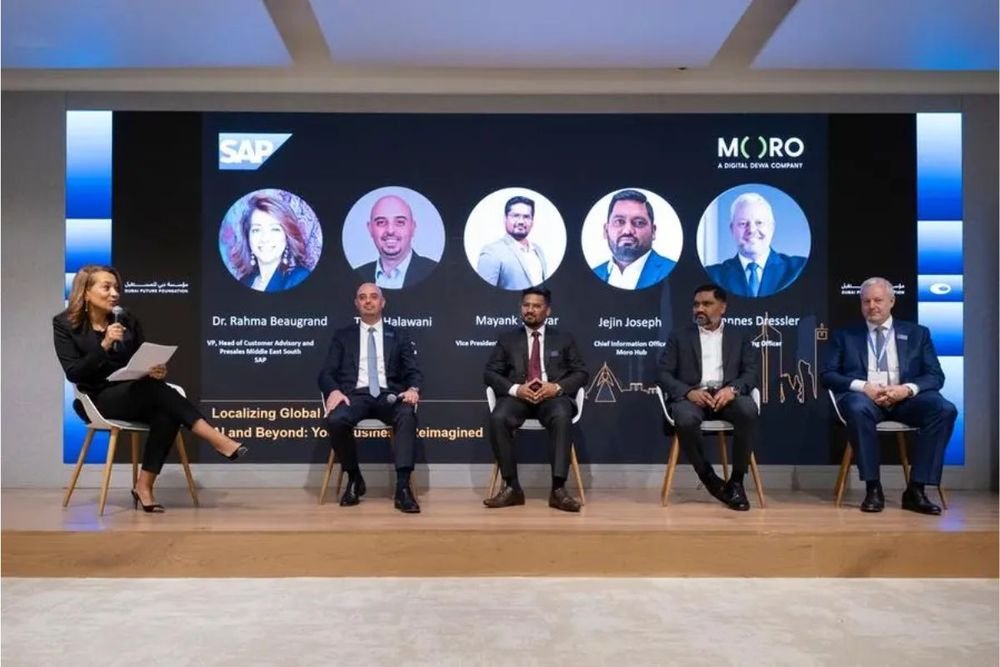The UAE is at the forefront of the GCC’s enthusiastic embrace of generative artificial intelligence, and its global prominence in adopting this emerging technology is exemplified, according to a senior executive at PwC Middle East.
The development of large language models in the Emirates has garnered international attention, driven by the government’s efforts to foster sector growth, stated Ali Hosseini, Chief Digital Officer and Partner at PwC Middle East, in an interview with The National.
Hosseini emphasized that the Emirates is well-prepared for exponential change and stresses that AI is not eliminating jobs but rather transforming them, as he spoke on the sidelines of the Dubai Assembly for Generative AI.
Furthermore, he highlighted a strong commitment to privacy and safety in these advancements, resulting in a growing preference for self-hosted models to ensure the secure and private handling of data.
The corporate sector, taking cues from the government’s direction, can unlock the potential of generative AI by adopting a three-pronged approach of learning, experimentation, and innovation with this technology, he noted.
“Initially, there should be a strong emphasis on deepening the understanding of generative AI capabilities, its potential implications and upskilling to expedite generative AI education within the company,” he said.
“This foundation understanding will be pivotal. The next step would include directing their resources towards building use cases, delivery model transformation, robust infrastructure and ensuring seamless adoption.”
Start-ups Drive Growth in Generative AI
Start-ups are poised to have a significant impact on the advancement and expansion of generative AI. They are well-placed to establish business models focused on the technology, which will cater to the substantial consumer market, as stated by Mr. Hosseini.
“Generative AI, distinct from many other emerging technologies, has the unique capability to impact every industry and application.”
“Its widespread inception and adoption can be compared to the rise of the internet or smartphones into our daily routines.”
The AI industry, which has a long history of applications in both businesses and society, experienced a significant disruption with the emergence of ChatGPT, developed by OpenAI with the backing of Microsoft. It garnered widespread attention due to its advanced conversational abilities.
This led to a competitive race involving major technology companies and influential personalities, including Microsoft, Google, Amazon, Oracle, and Elon Musk.
Emerging Generative AI Developments in the GCC: Pioneering Investments and Innovations
Generative AI is anticipated to hold substantial economic potential. GCC countries, for example, are expected to realize around $23.5B in economic benefits by 2030 as investments in generative AI continue to expand, according to a recent report from PwC’s unit Strategy& Middle East.
The UAE, the second-largest economy in the Arab world, has already introduced significant Large Language Models (LLMs) as part of its efforts to establish itself as a leader in the generative AI industry.
The Technology Innovation Institute, a research centre backed by the Abu Dhabi government, launched its flagship LLM, Falcon, and an advanced version to enhance generative artificial intelligence capabilities in the region, according to The National News.
Notably, Abu Dhabi-based AI company G42’s division Inception, the Mohammed bin Zayed University of Artificial Intelligence, and Silicon Valley-based Cerebras Systems jointly introduced Jais, an open-source bilingual Arabic-English model touted to be more accurate than other Arabic LLMs.
In Saudi Arabia, the largest economy in the Arab world, the generative AI market is projected to exceed $1T by 2030, with a compound annual growth rate of over a quarter, according to Statista data, up from nearly $220M in 2023.
The Transformative Power and Potential Risks of Generative AI in Business
For businesses, generative AI has the potential to generate value ranging from $2.6T to $4.4T in global corporate profits annually across 63 use cases where the technology can enhance productivity, as indicated by a recent study from the McKinsey Global Institute.
“Generative AI is one of the biggest paradigm shifts of our generation, introducing a significant opportunity for empowerment and transformation,” Mr Hosseini said.
“It is unique in its cross-functionality and disrupting industries. We can benefit from the power of generative AI, which will help reshape the workforce, increasing productivity and efficiency.”
PwC, as with other analysts and experts, also cautioned on the risks of generative AI, including the potential for misinformation and safety issues.
Mr Hosseini described these as a “barrier” preventing the widespread adoption of the technology.
“The possibility for models to produce inaccurate information or hallucinations emphasises the importance of users understanding these risks and relying on providers for education to ensure safe and responsible use,” he said.
“To mitigate issues like response bias and subjective rhetoric, it’s crucial to responsibly source the information used to train these models.”


